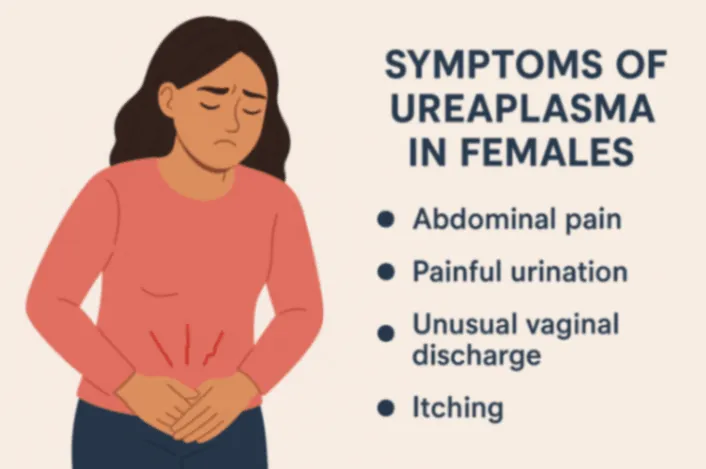Ever had a yeast infection and noticed that your period got late? It's normal to wonder, "Can a yeast infection delay your period?" Though a yeast infection is frustrating and uncomfortable for women, its effect on the menstrual cycle is not clear. Let's explore the blog to see whether such an infection can really delay your period and if something else is going on.
Can a Yeast Infection Delay Your Period? Quick Answer
Does a yeast infection affect your menstrual cycle? A yeast infection doesn’t directly delay your period — it doesn’t interfere with your reproductive hormones. However, certain related factors might be the real reason behind your delayed menstruation. They are:
- Hormonal changes: Before periods, there is a high increase in estrogen levels which reduces the vaginal pH level and leads to vaginal yeast infection. These hormonal changes also disrupt your period.
- Stress response: Stress from infections can affect the production of hormones, which can delay the ovulation process and your periods.
- Medicine effects: If you're using antibiotics to treat other health issues, these medications can interrupt the balance of yeast and bacteria, leading to infections and delaying your periods.
- Underlying medical conditions: Sometimes, yeast infections and delayed periods can occur simultaneously due to shared root causes such as PCOS (Polycystic Ovary Syndrome).
Other Common Reasons Your Period Might Be Late
Wondering why your periods actually get late? Here are the potential causes:
- Stress: By disrupting hormone balance, stress delays or stops the menstrual cycle or period.
- Weight Changes: Significant weight gain or loss can change the balance of hormones like progesterone and estrogen, which contribute to delayed or missed periods.
- Excessive Exercise: Practicing intense physical activities in excess can lead to increased use of energy, stress, and low body fat, which can disrupt your periods.
- Medications: Certain medicines like birth control pills, blood thinners, and steroids can also impact menstrual cycles.
- Perimenopause: Approaching the menopause stage can also be one of the factors that cause delayed or irregular periods.
Why Do Yeast Infections Often Happen Right Before Periods?
These are the causes of yeast infections before your period starts:
- Hormonal Imbalance: Increased estrogen levels before the period can change the body's hormonal balance, which contributes to the overgrowth of Candida, which is a fungus that causes a yeast infection.
- Weak Immune Response: The immune system may become weak before periods, making it much easier for Candida to grow.
- Antibiotic Use: Along with bad bacteria, antibiotics can also kill healthy bacteria that prevent the overgrowth of yeast, thus increasing the risk of yeast infections.
- Diet Factors: Sugar, processed foods, and simple carbs can feed the yeast present in the body, which leads to their excessive growth, causing infections.
- Uncontrolled Diabetes: Blood sugar levels can increase regularly in individuals with uncontrolled diabetes. As yeast feeds on sugar, there is an increased overgrowth of fungus, causing infections.
- Pregnancy & Oral Contraceptives: Pregnancy, as well as birth control pills, cause an imbalance of hormones such as estrogen. Increased estrogen levels can disrupt the yeast levels and lead to their overgrowth, causing infections.
- Mental Health Conditions: A study shows that anxiety, depression, and stress can increase the risk of recurrent vaginal yeast infections. This happens as these mental health issues affect the gut microbiome and immune system of the body.
When to See a Doctor?
See a doctor if your period is late by more than 1 week and you experience the following symptoms of a yeast infection before your period:
- Intense itching and irritation around and inside the vagina
- Burning sensation during sex or while peeing
- Thick and white discharge that looks like cottage cheese
- Vulva swelling
- Rashes on or inside of the vagina
- Vaginal pain or swelling
Healthcare providers can find out the exact cause of yeast infections and whether it is affecting your periods.
Diagnosis and Treatment of Yeast Infections
If you have delayed periods, the doctors will check you physically or perform a pelvic exam to look for symptoms. They will also examine the vaginal secretion under a microscope to detect potential yeast overgrowth. If there is a yeast infection, the providers will prescribe antifungal medications like:
- Topical Antifungals: Examples are clotrimazole, terconazole, and miconazole are effective options for mild yeast infections.
- Oral Antifungals: Examples include fluconazole to prevent the multiplication of Candida fungus. It is not recommended for pregnant women.
- Boric Acid Capsules: Placed into your vagina to treat yeast infections that do not resolve with antifungal medicines.
Tips to Prevent Vaginal Yeast Infections
Follow these tips:
- Wear breathable clothes: Choose to wear cotton underwear and loose pants for proper airflow.
- Stay dry: Immediately remove your wet clothes after swimming or workouts, as moisture easily traps yeast and bacteria.
- Practice good hygiene: Make sure to wash the vagina frequently with the help of a mild and unscented soap. Also, thoroughly dry out the washed area.
- Avoid harsh products: Never use aromatic wipes or tampons or vaginal sprays in the vagina, as they affect normal vaginal pH balance (which is basically between 3.8 and 5.0).
- Follow a healthy diet: Avoid or limit processed carbs or sugar as they feed fungus or yeast.
- Practice safe sex: Use condoms or diaphragm during sex to lower the risk of interrupting the vaginal microbiome which can contribute to yeast infections.
- Improve your immune system: Consume a well-balanced diet, practice exercise, get adequate sleep, and manage stress to strengthen your immune system.
- Take antibiotics only when needed: Using antibiotics unnecessarily can destroy beneficial bacteria that help prevent the overgrowth of yeast.
Summing Up
So, can a yeast infection delay your periods? While yeast infections themselves won’t directly delay your period, they can be part of a bigger picture. From stress and hormonal imbalance to medications and other infections, many factors can disrupt your cycle. If you're concerned, talk to a gynecologist for proper diagnosis and treatment.
—You deserve peace of mind and proper care.
FAQs
What to do if a yeast infection keeps coming back?
See a doctor who can help rule out the exact issues and provide the right treatment, like prescription antifungals, maintenance therapy, boric acid suppositories, and lifestyle changes.
What are the home remedies to treat a vaginal yeast infection?
Probiotic-rich foods, coconut oil, tea tree oil, and probiotic supplements are the perfect home remedies to treat vaginal yeast infections.
How to know whether it's a yeast infection or an STI?
Yeast infections produce white, thick, and cottage cheese-like vaginal discharge that has a strong smell. On the other hand, STIs lead to yellow, grey, or green discharge that comes along with soreness and pain.
What infections can delay your period?
Pelvic Inflammatory Disease (PID), which is caused by sexually transmitted infections like gonorrhea or chlamydia, can delay periods.
अक्सर पूछे जाने वाले प्रश्नों
What to do if a yeast infection keeps coming back?
See a doctor who can help rule out the exact issues and provide the right treatment, like prescription antifungals, maintenance therapy, boric acid suppositories, and lifestyle changes.
What are the home remedies to treat a vaginal yeast infection?
Probiotic-rich foods, coconut oil, tea tree oil, and probiotic supplements are the perfect home remedies to treat vaginal yeast infections.
How to know whether it's a yeast infection or an STI?
Yeast infections produce white, thick, and cottage cheese-like vaginal discharge that has a strong smell. On the other hand, STIs lead to yellow, grey, or green discharge that comes along with soreness and pain.
What infections can delay your period?
Pelvic Inflammatory Disease (PID), which is caused by sexually transmitted infections like gonorrhea or chlamydia, can delay periods.
लेखक





